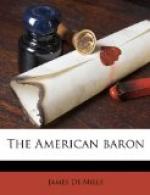If any thing had been needed to complete Ethel’s despair it was this second visit and the project of a ride. Mrs. Willoughby was introduced to him; but he took little notice of her, treating her with a kind of reserve that was a little unusual with him. The reason of this was his strong sympathy with his friend, and his detestation of Mrs. Willoughby’s former history. Mrs. Willoughby, however, had to ride with them when they went out, and thus she was thrown a little more into Hawbury’s way.
Ethel never made her appearance. The headaches which she avouched were not pretended. They were real, and accompanied with heartaches that were far more painful. Hawbury never saw her, nor did he ever hear her mentioned. In general he himself kept the conversation in motion; and as he never asked questions, they, of course, had no opportunity to answer. On the other hand, there was no occasion to volunteer any remarks about the number or the character of their party. When he talked it was usually with Lady Dalrymple and Minnie: and with these the conversation turned always upon glittering generalities, and the airy nothings of pleasant gossip. All this, then, will very easily account for the fact that Hawbury, though visiting there constantly, never once saw Ethel, never heard her name mentioned, and had not the faintest idea that she was so near. She, on the other hand, feeling now sure that he was utterly false and completely forgetful, proudly and calmly held aloof, and kept out of his way with the most jealous care, until at last she staid indoors altogether, for fear, if she went out, that she might meet him somewhere. For such a meeting she did not feel sufficiently strong.
Often she thought of quitting Naples and returning to England. Yet, after all, she found a strange comfort in being there. She was near him. She heard his voice every day, and saw his face. That was something. And it was better than absence.
Minnie used always to come to her and pour forth long accounts of Lord Hawbury—how he looked, what he said, what he did, and what he proposed to do. Certainly there was not the faintest approach to love-making, or even sentiment, in Hawbury’s attitude toward Minnie. His words were of the world of small-talk—a world where sentiment and love-making have but little place. Still there was the evident fact of his attentions, which were too frequent to be overlooked.
Hawbury rapidly became the most prominent subject of Minnie’s conversation. She used to prattle away for hours about him. She alluded admiringly to his long whiskers. She thought them “lovely.” She said that he was “awfully nice.” She told Mrs. Willoughby that “he was nicer than any of them; and then, Kitty darling,” she added, “it’s so awfully good of him not to be coming and saving my life, and carrying me on his back down a mountain, like an ogre, and then pretending that he’s my father, you know.




